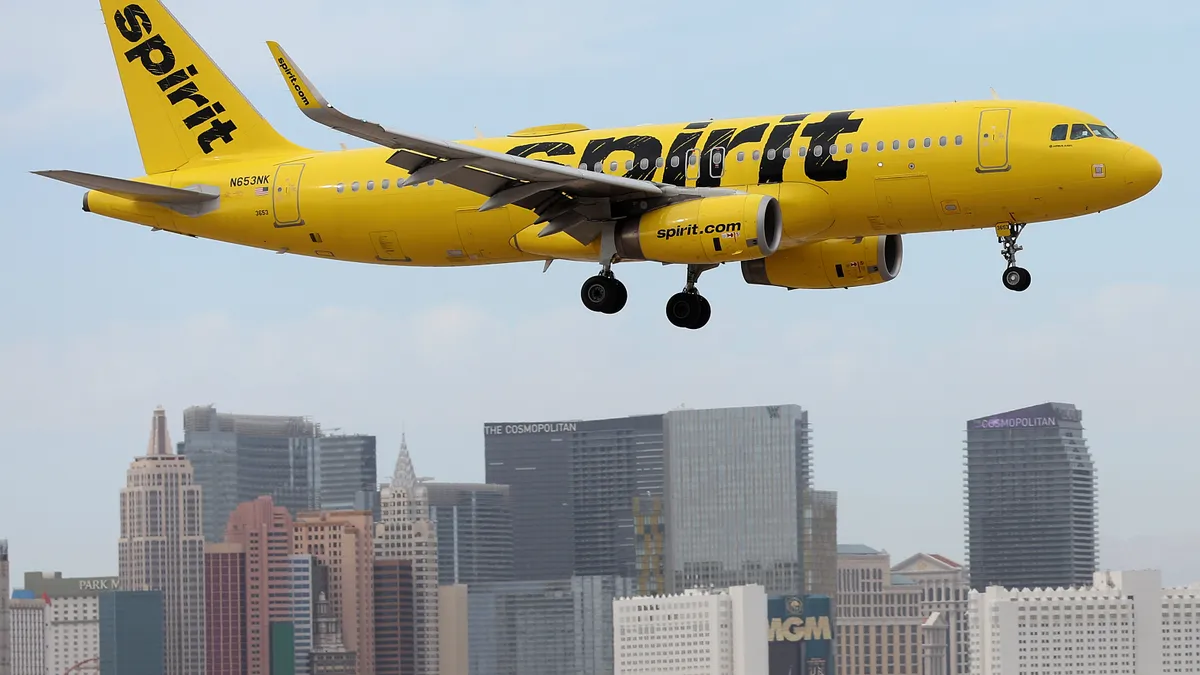Dive Brief:
- Spirit Airlines is in urgent talks with bondholders to restructure secured and convertible notes due in 2025 and 2026 ahead of a critical deadline next month related to its credit-card processing agreement with U.S. Bank National Association. Citing people familiar with the matter, Wall Street Journal reported Tuesday that Spirit is preparing for a bankruptcy filing within weeks, following the end of talks with Frontier Airlines about a potential merger.
- Spirit told investors Wednesday it’s unable to file third-quarter financial statements because management is focused on the debt negotiations, which are “productive, have advanced materially and are continuing in the near term.”
- If a debt deal is reached, Spirit said it expects to complete “a statutory restructuring” that would cancel existing equity while not impairing other parties, such as unsecured creditors, customers, vendors and aircraft lessors.
Dive Insight:
Spirit is dealing with holders of its senior secured notes, which pay 8%, and are due in September 2025, and convertible senior notes due in 2026. Spirit has about $3.3 billion in long-term debt, with the largest tranche, $1.27 billion, due next year.
A spokeswoman for Frontier Airlines declined to comment Wednesday on any talks with Spirit. A Spirit representative said the company had no comment beyond its filing with the Securities and Exchange Commission.
Shares of Spirit, the seventh-largest U.S. airline, dropped 59% Wednesday, to $1.31, part of a 92% decline in 2024.
Spirit’s most immediate deadline is Dec. 23, the date it negotiated last month with US Bank related to the covenants underlying the payments from its ticket sales. Absent a deal with bondholders, or protection from a bankruptcy court, Spirit could face a holdback on cash from its flights sold by credit card.
Most airline agreements with their credit-card processor banks contain such terms related to liquidity thresholds and other debt metrics. They serve as protection for financial institutions related to a carrier’s ability to fulfill the future service it has sold.
In 2008, for example, Frontier Airlines filed for Chapter 11 bankruptcy after its card processor, First Data, increased the amount it would reserve from Frontier for each sales transaction.
Spirit’s ability to return to profitability is, of course, one likely consideration for bondholders. Over the summer, the carrier unveiled a significant revamping of its on-board product as it seeks to market a more comfortable travel experience with higher fares – not selling strictly on cheap fares.
The “new era” for Spirit, which launched on Aug. 27, includes a more premium experience based on four fare categories, including a new “Go Big” option with the carrier’s “Big Front Seat” premium cabin, priority check-in and boarding and complimentary snacks and drinks.
Spirit, which is based in Dania Beach, Florida, has taken other steps to bolster its liquidity. On Oct. 18, it agreed to sell 23 Airbus jets for $519 million to GA Telesis, an aviation leasing firm.
In July, Spirit, Airbus and aircraft lessor AerCap Holdings agreed to a transaction in which the lessor acquired three dozen Airbus A320neo family jets from Spirit’s pending orders with Airbus, including predelivery payments. Those planes are expected for delivery in 2027 and 2028.
Spirit and its acquisition suitor, JetBlue Airways, abandoned their planned $3.8 billion merger after a federal court in Massachusetts ruled in January that the combination would harm competition in the air-travel industry.
The Justice Department, six states and the District of Columbia sued last year to block the sale. During a quarterly earnings call shortly after the court decision, Spirit Chief Executive Officer Ted Christie sharply criticized the DOJ’s antitrust suit and widespread speculation that his company would need to seek bankruptcy protection.
“It’s beyond absurd for the government to claim a victory for the American consumer,” Christie said on the Feb. 8 call.











